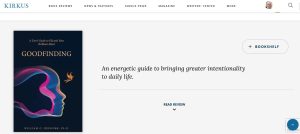Kirkus Indie Review Came In!

I received a very positive review from Kirkus Reviews on Goodfinding: A User’s Guide to EQ and Your Brilliant Mind. You can read the full review here.
Here are a few excerpts:
“Plainspoken bits of wisdom will make DeFoore’s book appealing to readers seeking a bit of reinvention.”
“A clear, straightforward, explanatory style.”
“Tone of strong encouragement runs throughout the book.”
“A blueprint for greater mental clarity and effectiveness.”
“An energetic guide to bringing greater intentionality to daily life.”
Full Review:
DeFoore provides a blueprint for greater mental clarity and effectiveness in this self-help guide.
“Goodfinding” is “the practice of gratitude for the benefits of your past experiences, appreciation of your present blessings and opportunities, and optimism about the positive possibilities that lie ahead for you,” writes the author, emphasizing what he refers to as the “time travel” aspect of the human mind, capable of pondering the past, assessing the present, and planning for the future. His practice involves three key changes in thinking: a shift from negative to positive thinking, a change from outer focus to inner focus (to remind the reader that one is “the driver of your own car, the captain of your own ship, and the creator of your own reality”), and a pivot from “living at effect” to “living at cause.” DeFoore asserts that by following this practice, one is “learning to use your brilliant mind to its maximum benefit, contributing to your own well-being and that of the world around you.” The author frequently references Daniel Goleman’s Emotional Intelligence (1995), assuring his readers that they have brilliant minds (“I’m not saying that because I know anything about your intelligence,” DeFoore writes; “I’m saying that because a brilliant mind is standard equipment in the human organism”). This tone of strong encouragement runs throughout the book, which advises readers on everything from improving their finances (“a positive relationship with money is essential to your ongoing health and happiness”) to the practice of “gratitude journaling.” The author has a large number of abstruse topics to cover, and he’s very much aided in doing so by a clear, straightforward, explanatory style when clarifying his terms: “If a thought, belief, or course of action promotes life, health, and happiness and doesn’t harm you or others,” he writes, “then it is authentically positive.” Such plainspoken bits of wisdom will make DeFoore’s book appealing to readers seeking a bit of reinvention.
An energetic guide to bringing greater intentionality to daily life.


